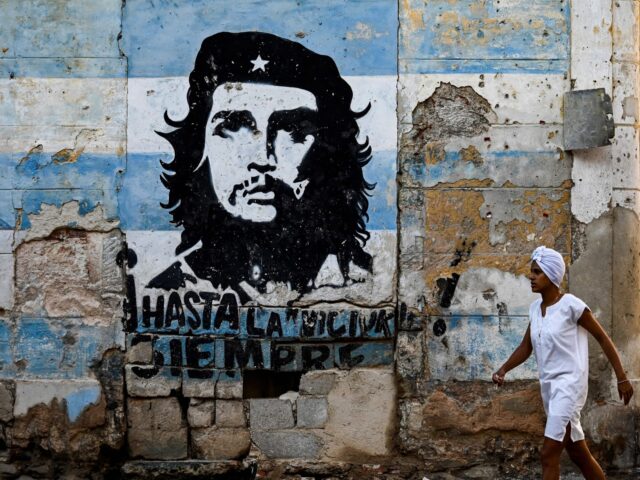Cuban citizens carried out a new round of peaceful protests against the communist Castro regime throughout the weekend, once again demanding freedom and protesting against the blackouts and inhumane conditions that the Castro regime continues to subject them to.
Cuba’s decades-long humanitarian crisis has worsened following the regime’s mismanagement of the emergency situation following the passage of Hurricane Ian.
On Saturday, dozens of Cuban citizens gathered outside the regime’s Municipal Assembly headquarters in Jagüey Grande, Matanzas province, to bang pots and pans and demand electricity in the face of another mandatory evening blackout.
Cuban online newspaper 14 y Medio reported that the Castro regime temporarily restored power in the area during the protest. According to one of the protesters, the temporary restoration of electrical power was done to better identify protesters.
“That’s to see people’s faces,” said one of the protesters, as a group continued to chant “Freedom!”
Con gritos de “¡libertad, libertad!”, manifestantes protagonizaron un cacerolazo en Jagüey Grande
#Video Con gritos de “¡libertad, libertad!”, manifestantes protagonizaron un cacerolazo en Jagüey Grande, Matanzas. Más información en 14ymedio.com
Posted by 14ymedio on Sunday, October 9, 2022
According to Radio Televisión Martí, the Castro regime suppressed the protests using paramilitaries dressed in civilian clothes and armed with wooden clubs. At least four dozen protesters were detained, many of which were beaten and prosecuted in retaliation.
On Sunday, the largest registered protest occurred in the towns of Santa Cruz del Sur, located in eastern Camagüey province, and Bejucal, Mayabeque, close to Havana. In each of these two towns, peaceful protesters took the streets to demand power be restored and call for an end of the Castro regime.
Alongside the calls for freedom and and end to communism, some of the chants espoused by the protesters were: “Put the electricity on, goddamn it;” the now common “Díaz-Canel singao,” which roughly translates to “asshole Díaz-Canel,” a reference to the regime’s puppet president Miguel Díaz-Canel; and “abajo los barrigas llenas de allá arriba”: “Down with the full-bellies up there,” the “full-bellies” being Communist Party leaders.
Cuban artist Saúl Manuel published a video on his Facebook account showing a resident of Santa Cruz del Sur who participated in Sunday’s protest shouting, “That is enough! The children are without food!”
Posted by Saúl Manuel on Sunday, October 9, 2022
René Fernández Quiroga, Cuban activist and resident of Santa Cruz del Sur, told Radio Televisión Martí on Monday that the protests, which initially started with three to four protesters, turned into a rally of over 500. Quiroga also said the Castro regime began its repression against Sunday’s protesters on Monday morning.
“A neighbor near my house, a young man who must be around 24 years old or so and is a musician in the Santa Cruz band, is under arrest,” Quiroga said to Radio Televisión Martí.
Cubans have consistently protested against the communsist Castro regime, which has ruled the island nation for more than six decades. Protests against the Castro regime have noticeably increased over the past two months, accelerating a trend that erupted on July 11, 2021.
A report published by the Cuban Observatory of Conflict on October 3 details that September 2022 had the most number of confirmed protests against the Castro regime in 2022 so far, with 364 protests. The amount slightly surpassed the 361 anti-communism protests documented during August 2022, which averaged to 11 protests per day.
The report further details that, while the aftermath of Hurricane Ian and the daily power blackouts are catalysts for the protests, the main driving force of the continues to be the demand for an end of communism in Cuba.
The Castro regime, in light of the growing discontent and increase in peaceful protests, has resorted to minimizing and discrediting the protesters using its media apparatus, going as far as to extract forced “confessions” from detainees.
Such is the case of Mayelín Rodríguez Prado, detained by the Castro regime for having recorded and published videos of the protests that took place between August 18 and 19 in Nuevitas, Camagüey, where Cuban police forces assaulted three preteen girls.
The Spain-based website Diario De Cuba reported that Cuban state news Noticiero Estelar ran a segment on October 5 on Rodriguez Prado who, appearing notably thinner, read a “confession” stating that she was ‘recruited’ via Facebook and paid by foreign actors to record and publish the videos that got her arrested.
The Castro regime, through its Granma newspaper, accused the United States of being behind the protests, which the regime has described as “terrorist acts.” While seeking to delegitimize and discredit the peaceful protests, the Castro regime has ramped up its repression of the protesters.
The Cuban Observatory for Human Rights (OCDH), a non-governmental organization, reported on Monday that at least 275 acts of repression carried out by the Castro regime against protesters were documented during September. The Observatory clarified that the total amount is near impossible to quantify, as the Observatory cannot document the massive amount of arbitrary arrests, threats, and harassment carried out by the Castro regime against Cuban civilians in its entirety.
Christian K. Caruzo is a Venezuelan writer and documents life under socialism. You can follow him on Twitter here.

COMMENTS
Please let us know if you're having issues with commenting.